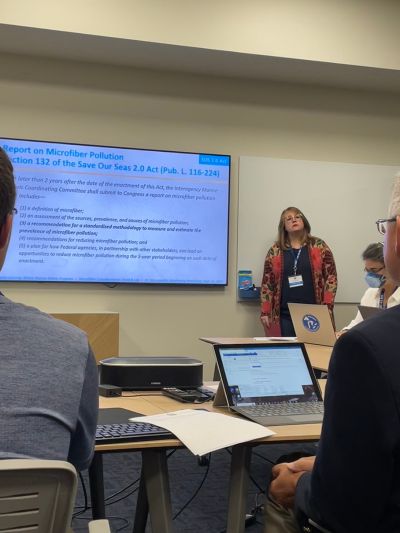International Working Group Meets to Develop Monitoring Program for Microplastics in the Great Lakes
OCT. 2, 2023 — On September 12-13, 2023, the NOAA Marine Debris Program attended and presented at an International Joint Commission (IJC) workshop on developing a monitoring framework for microplastics in the Laurentian Great Lakes. The NOAA Marine Debris Program’s Great Lakes Regional Coordinator, Haley Dalian, and Research Coordinator, Carlie Herring, participated in the workshop, which was held in Ann Arbor, Michigan.

This was the first workshop in a two-part series for the IJC Microplastics Monitoring and Risk Assessment Working Group. The IJC Working Group consists of subject matter experts, working in a voluntary capacity, helping to develop recommendations on microplastics management for the IJC’s Science Advisory Board.
The objectives of the workshop included: 1) developing methods for sampling microplastics in various environmental compartments such as tributary and lake waters, sediments, and biota, 2) discussing quality assurance/quality control measures when collecting field samples, 3) designing experiments to capture spatial and/or temporal trends, and 4) evaluating if microplastics sampling could fit into existing environmental monitoring programs. Together, the working group’s insights will guide creation of a monitoring framework that could be implemented in the Great Lakes and adapted in other regions. Data from a comprehensive monitoring program can inform future risk assessments and support future efforts to classify microplastics as a sub-indicator for State of the Great Lakes reporting under the Great Lakes Water Quality Agreement.
Herring gave a presentation on considerations for collecting and analyzing microfiber debris from environmental samples. Along with representatives from other governmental agencies, Herring participated in a panel discussion of the greatest needs and barriers when considering creating microplastics monitoring programs.
Members of microplastics monitoring working groups from the Chesapeake Bay region and Southern California also attended the workshop for cross-regional collaboration, relationship building between these various groups, and to align and harmonize monitoring frameworks.
